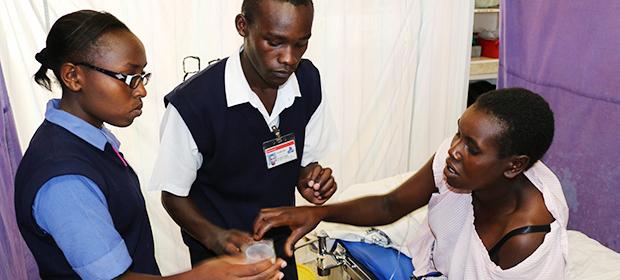Where We Work
See our interactive map


“When I received admission to Tenwek School of Nursing, my excitement overshadowed my family’s financial challenges,” says Caren Chirchir, a young woman in Kenya.Caren is the second of five children and she carries her family’s hope for a better future. Her older sister dropped out of school to get married.When Caren’s father heard about her acceptance he called her aunties and uncles to ask for help paying her tuition fees. “Sad as it may sound, they advised my father to marry me off,” she says.But her father told them his daughter would go to school even if he’d have nothing left.
The high cost of medical training With training costing about 70,000 Kenya Shillings ($767) a year for most middle-level colleges like Tenwek, many students are unable to raise enough money and end up dropping out of their programs. So Caren’s father organized a fundraising event. Neighbors contributed enough for her to report to school. But the money didn’t last long and the fees kept coming. She was soon sent back home. “To reduce the frequency of disruptions, my father offered to supply the school with beans from our small farm,” says Caren. “While this kept me in school for some time, it deprived my family of their livelihood. They lacked more and more. It pained me so much.” Caren kept going back to school, hoping she was still considered enrolled in classes. In her second year, she received a scholarship that covered fees for one semester. But the remaining semester brought even more interruptions. “I had no peace of mind and couldn’t concentrate on my studies. I worried about where I would get money to pay for my fees. Every time I would be sent home, I would lose a lot,” she notes.
Kenya’s shortage of skilled health workers Kenya has a serious shortage of health workers, with only 1 doctor, nurse, ormidwife for every 1,000 people. This is less than half the minimum number recommended by the World Health Organization. Kenya’s growing population puts a further strain on the health workforce, which has a detrimental impact on the delivery of quality health services. In order for the Ministry of Health and other stakeholders to address current staffing shortages and plan for the future, the country must significantly increase the number of graduates from its health professional schools. And unless there is a sufficient pool of qualified, well-trained health professionals, universal access to health care—a vision set forth in the Kenyan constitution—will not be realized.
Hope for medical students to stay in school
To help students like Caren and their families meet the financial burden associated with medical training and to help reduce provider shortages, IntraHealth International’s FUNZOKenya project partnered with the Higher Education Loans Board, the Kenya Healthcare Federation, and other stakeholders in the private and public sectors to establish a new loan program. The Afya Elimu Fund aims to provide a sustainable funding mechanism for health workers training in the country.Students apply for a loan to cover their tuition fees, and can receive a maximum of 70,000 Kenya Shillings ($767) a year. No interest is charged during their time in school. On completion of their studies, students are given a one-year grace period before they start paying back their loans at an interest rate of 4% (compared to 12.5% market interest rates in Kenya). The repayments revolve back into the fund as a continuing resource for future students.
Relief for Caren In its first year, Afya Elimu Fund gave loans to 2,050 professional health students. Caren was one of them. “The Afya Elimu Fund provided me with a lot of relief,” she says. “I received loans that enabled me to clear my tuition arrears and pay part of my third year fees.” Caren is now able to concentrate for the first time on her studies, and her performance is improving. And equally as important to her, her father can now focus his full attention on her younger siblings.10,000 more studentsOver the last three months, the fund received contributions from two local organizations. The Family Group Foundation donated 1,250,000 Kenya Shillings (approximately $13,658) and committed an additional 12,500,000 Kenya Shillings (approximately $136,576) to support ten health students a year for ten years. The I&M Bank donated 625,000 Kenya Shillings (approximately $6,824) and pledged a similar amount for the next three years.As many as 10,000 students are expected to receive loans in the first five years of the program.With one Caren Chirchir at a time, the program seeks to ensure that all aspiring health workers realize their dreams and go on to improve access to high-quality health care across the country.Photo by Peter Abwao for IntraHealth International (Caren and her classmate care for a client)IntraHealth's FUNZOKenya project is funded by the US Agency for International Development.
Get the latest updates from the blog and eNews




